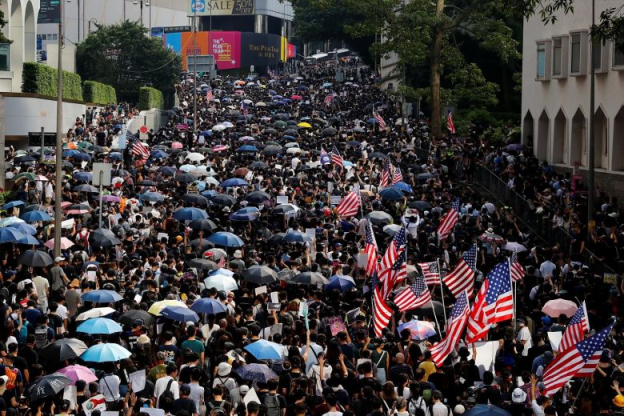Hong Kong Chief Executive Lam to Withdraw Extradition Bill; Protests Continue
Hong Kong's Chief Executive Carrie Lam Cheng Yuet-ngor announced on September 4, 2019, that she will formally withdraw the controversial extradition bill that touched off three months of large-scale protests across the city. While acknowledging Lam's concession, various groups that support the ongoing protests have stated they intend to continue to organize demonstrations until Lam and the Hong Kong government comply with the protesters' "five demands" in full (see text box). On September 8, 2019, tens of thousands of people gathered outside the U.S. Consulate General in Hong Kong urging the U.S. Congress to pass the Hong Kong Human Rights and Democracy Act of 2019 (H.R. 3289, S. 1838). (See Figure 1.)
The Hong Kong Extradition Bill and Protests
On April 3, 2019, Lam submitted to Hong Kong's Legislative Council (Legco) proposed amendments to the Fugitive Offenders Ordinance (FOO) that would permit (among other things) extradition of alleged criminals from Hong Kong to mainland China (see CRS In Focus IF11248, Hong Kong's Proposed Extradition Law Amendments). Large-scale demonstrations on June 9 and 12 led Chief Executive Lam to announce on June 15 the suspension of consideration of the bill. On June 16, protesters gathered in even larger numbers, calling for formal withdrawal of the bill.
Since then, large-scale, largely peaceful protests, as well as sometimes violent confrontations between the Hong Kong police and more militant protesters, have occurred in various parts of Hong Kong every week. The protesters see the proposed amendments as part of the continuing erosion of "the high degree of autonomy" the Hong Kong Special Administrative Region (HKSAR) was promised in the Joint Declaration, an international treaty that transferred sovereignty over Hong Kong from the United Kingdom to China on July 1, 1997.
Lam and other HKSAR officials have repeatedly proclaimed the protests to be "riots." The Hong Kong police have used more than 2,300 rounds of tear gas and arrested nearly 1,200 people in an effort to end the demonstrations. A consensus emerged among the protesters that Lam and the HKSAR government must comply with "five demands" mentioned previously.
Lam's Statement
On September 4, 2019, Lam stated her government "will formally withdraw the bill in order to fully allay public concerns." She also said that she and her senior officials "will reach out to the community to start a direct dialogue," and "will invite community leaders, professionals, and academics to independently examine and review society's deep-seated problems."
While the withdrawal fulfills the first of the five demands, Lam indicated that she will not comply with the other four demands. Early in her statement, Lam said "matters relating to police enforcement actions are best handled by the existing and well-established Independent Police Complaints Council (IPCC)," obviating the need to establish an independent investigation into alleged police brutality. Regarding the dropping of charges, she stated, "this is contrary to the rule of law." On use of the word "riot," she asserted that such a categorization has no legal effect as it is up the Department of Justice to determine what crime may have been committed. On the fifth demand, Lam indicated that current circumstances are not suitable for adoption of universal suffrage.
Response of Protesters
Various groups supporting the protests dismissed Lam's statement. Legco's pro-democracy coalition leader Claudia Mo Man-ching characterized Lam's statement as "too little, too late." Umbrella Movement leader Joshua Wong Chi-fung said, "In the face of police brutality … the protest by Hongkongers will continue even if the extradition bill is withdrawn." At the Citizens Press Conference, masked representatives of more militant protesters stated:
[P]lease do not think this government has backed down, because it certainly has not. It is just seeking to create confusion, attempting to distract and escape accountability.… [A]pplying a band-aid months later onto rotting flesh will simply not cut it.
Following Lam's statement, spontaneous protests arose in Hong Kong's Mong Kok, Prince Edward, and Po Lam districts. Police in riot gear were deployed to all three locations, but no tear gas was used. Protests were held every day the following weekend, including the one on Sunday at the U.S. Consulate General.
|
Figure 1. Aerial View of Protest Outside U.S. Consulate General in Hong Kong |
 |
|
Source: Reuters |
Response of China and Hong Kong Governments
China has repeatedly criticized U.S. Members of Congress and diplomats for meddling in China's "internal affairs," "whitewashing" and "glorifying" rioters, and "slandering" the Hong Kong police. State media in China have made unsubstantiated allegations that the U.S. government is financing and organizing the protests and identified U.S. Consulate personnel allegedly involved. Defending its implementation of its "One Country, Two Systems" policy, China has emphasized, "'One Country' is the foundation of and prerequisite for 'Two Systems.'" On September 9, 2019, the HKSAR government issued a statement in which it expressed "regret over the re-introduction of the [Hong Kong Human Rights and Democracy] Act and reiterates that foreign legislatures should not interfere in any form in the internal affairs of the HKSAR."
Pending Legislation
The Hong Kong Human Rights and Democracy Act of 2019 (H.R. 3289, S. 1838) would amend the U.S.-Hong Kong Policy Act of 1992 (P.L. 102-383) to require the Secretary of State to produce an annual report assessing the status of Hong Kong's autonomy, as well as impose sanctions on officials of China and Hong Kong who the President determines are responsible for suppressing basic freedoms in Hong Kong. Speaker Nancy Pelosi has indicated that she would support consideration of the bill by the House of Representatives. H.Res. 543 would condemn China's interference in Hong Kong and "calls on the Administration to ensure that munitions and crowd-control equipment the United States sells to the Hong Kong police aren't used to repress peaceful protests in Hong Kong."